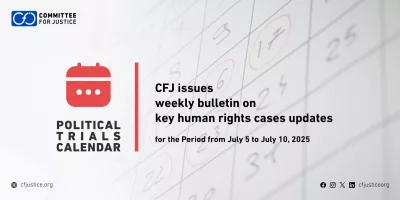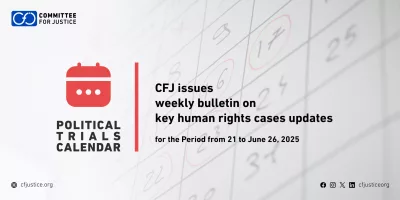The Committee for Justice (CFJ) said that within the framework of its Justice Watch project that monitors the justice system in Egypt, our team examined the files of Case No. 267/2015, Criminal/Military/Ismailia/Total, Registered under No. 29/2015, Criminal/Military/North Sinai/Partial, and prepared a report on the key violations that marred the case.
At the beginning of its report, CFJ stated that on August 14, 2013, a number of people gathered in the vicinity of the Bir al-Abd police station in North Sinai Governorate, and stormed the station, destroyed its contents, stole military weapons, destroyed police cars, and attacked police officers.
A report on the incident was written, and the North Sinai Prosecution started the investigations and requested National Security Sector investigations into the incident. The investigations confirmed the incident and specified the names of the persons involved in it, and immediately the prosecution ordered the arrest of those persons and brought them to the investigations. The prosecution then started investigations with them during the period from 9/19/2013 to 9/9 6/2014, and subsequently referred the civilian defendants to the Ismailia Military Prosecution. The case was registered with No. 267/2015, Criminal/Military/Ismailia/Total.
The CFJ added that the Ismailia Military Prosecution, headed by Colonel Mahmoud Ibrahim Ghazi, issued an indictment in the case against 72 defendants and ordered their referral to the Military Criminal Court. On January 18, 2017, the Military Criminal Court issued its verdict against the 72 defendants. The court sentenced 4 of the defendants to rigorous imprisonment for a period of 10 years and acquitted 20 of the accused, while 40 defendants were sentenced in absentia to life imprisonment and a fine of 20,000, and five others sentenced in absentia to life imprisonment, and three defendants were sentenced in absentia to to 10 years imprisonment and a fine of 20,000. Those convicted were obliged to refund the value of the damages.
CFJ’s Fair Trials team confirmed that the defendants in that case were subjected to many violations during the investigation and trial phases, the most prominent of which were:
Nineteen defendants were subjected to enforced disappearance, for periods ranging from one to 219 days. During those periods, information about them was withheld from their families, and they were prevented from communicating with the outside world. The statements of the defendants showed that they were forcibly disappeared inside the Bir al-Abed Police Station, the North Sinai Security Directorate, the Al-Galaa Camp, and Al-Azouli Prison.
The case papers also stated that seven of the defendants were subjected to torture, according to the investigations with them, including beatings and insults, torture with electricity, and poor conditions of detention.
The team stated that, by reviewing the case papers, it also discovered that the prosecution conducted the investigation with 4 of the defendants without the presence of a lawyer, under the pretext of the closure of the Lawyers Syndicate or the absence of anyone to appoint a lawyer, or not receiving a response when contacting the Syndicate.
The defendant Muhammad Mahmoud Suleiman Muhammad was also subjected to renewed arrest (recycling detention), as he stated in the investigations of the Public Prosecution on 12/27/2013. He was imprisoned in the Central Prison pending another case, and he was acquitted on 12/25/2013. While completing the procedures for his release, he was detained and brought before the prosecution on the same day.
The case papers were also based on the opaque investigations conducted by Major Muhammad Eid, an officer in the National Security Sector, in which he relied mainly on secret, unknown sources.
In addition, the defendants were tried before a military court despite being civilians, which is a violation of the right to an impartial and independent trial. As Article 14 of the International Covenant on Civil and Political Rights states: “All persons shall be equal before the courts and tribunals. In the determination of any criminal charge against him, or of his rights and obligations in a suit at law, everyone shall be entitled to a fair and public hearing by a competent, independent and impartial tribunal established by law.” This is not achieved in the military judiciary, which has political and institutional biases, due to its being subordinate to the Minister of Defense, which invalidates its impartiality and independence.






